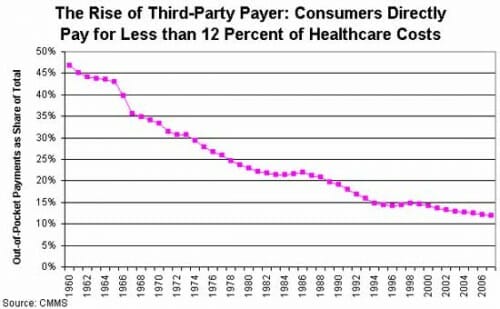Health Care Incentives
There are very few problems that can't be traced to information and incentives. I thought of this when Tyler Cowen discusses an attempt to improve health care costs with better information:
The health care reform bill before the U.S. Senate would require hospitals to publicize their standard charges for services, but New Hampshire and Maine have gone much further in trying to make health care costs more transparent to consumers.
New Hampshire and Maine are the only states with Web sites that let consumers compare costs based on insurance claims paid there.
In New Hampshire, the price variation across providers hasn't lessened since the Web site went live in 2007.
The problem is that this is all useless if individuals have not particular incentive to shop. If I were on Unemployment, would I bother to check a web site to see which unemployment offices had the lowest operating costs and go there to get my check? No way, what incentive would I have to do so? I am going to the closest one, or the one with the fewest lines. Ditto with most people and health care:

Of course, the new health care bill will only make this worse. Those of us who actually have an incentive to shop, either with high deductible policies and/or HSA's will see our policies banned. The new health care bill has done nothing but attempt to drive this line all the way to zero.
Update: IBD publishes on the exact same topic (I beat them by 12 hours).
Patients have little direct connection in paying for their care. Their role has fallen significantly. Meanwhile, the government's involvement has grown, as has that of the insurance industry.Because so many Americans rely on an insurance policy or a government program to pay their health care bills, the internal governors that temper the rest of their purchases are turned off. When a visit to the doctor's office or a diagnostic test costs them a mere $10 or $20 co-payment out of pocket "” or there is no charge at all "” cost has little impact on their decision to see a doctor.
"By not knowing the full costs associated with health care, consumers demand more and 'overuse' it," Kenneth E. Thorpe explained a few years back in Health Affairs.
Americans would be more judicious in seeking health care "” they would self-ration "” if the right incentives were in place. An effective way to cut overuse and bring down costs would be to encourage through public policy the use of health savings accounts. If consumers used HSAs to pay the full amount for medical care at the point of service rather than letting employer-funded insurance or a government program pay the bills, the demand would fall.
The Democrats' health care legislation, however, puts more distance between Americans and the payment process and promotes dependence on government. That will only drive down consumers' out-of-pocket expenses even further and force overall health care spending upward. Under such a regime, the system will be worse off than it is now.
Information is worthless if you can't make use of it.
Exactly.
My wife gets semiannual blood tests for Lipitor. She usually goes to the doctor's office, which requires scheduling an appointment in advance and the hours are somewhat limited.
The doctor charges around $375, which gets written down to around $250 by Blue Cross, then we pay $50.
They now offer blood testing through the local emergency care center...no appointment needed, come in any time. My wife prefers this, but the bill for the same exact test is $985. Blue Cross writes it down to $600 or so, but we still pay only $50.
Guess where my wife goes for her blood tests?
My blood pressure specialist spent 4 years trying different prescriptions on me, none of which made any difference. He started with the most common, and cheapest, drugs and worked up to exotic, expensive ones. When he ran out of stuff to try, I suggested we go back to the cheap stuff, since it didn't work any worse.
It was obvious by the look on his face that no one had ever suggested that before.
That is quite an interesting and scarry graph. I was wondering if you could plot another if you have the information. Could you plot the percentage of GDP devoted to Healthcare vs. the out-of-pocket payment ratio. Thanks.
Chris - just to share a bit of scary medical history. I was prescribed lipitor in 2002. After half a year, my cholesterol values were 2% lower, but all my liver function tests were off the map. I stopped taking liptor, but the liver values never recovered.
Chris - just to share a bit of scary medical history. I was prescribed lipitor in 2002. After half a year, my cholesterol values were 2% lower, but all my liver function tests were off the map. I stopped taking lipitor, but the liver values never recovered.